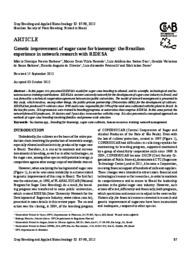Genetic improvement of sugar cane for bioenergy: the Brazilian experience in network research with RIDESA.
Genetic improvement of sugar cane for bioenergy: the Brazilian experience in network research with RIDESA.
Author(s): BARBOSA, M. H. P.; RESENDE, M. D. V. de; DIAS, L. A. dos S.; BARBOSA, G. V. de S.; OLIVEIRA, R. A. de; PETERNELLI, L. A.; DAROS, E.
Summary: In this paper, it is presented RIDESA?s model for sugar cane breeding to ethanol, and its scientific, technological and human resources training contributions. RIDESA is an inter-university network for the development of sugar cane industry in Brazil, and was formed by a technical cooperation agreement between ten public universities. The model of network management is presented in this study, which involves, among other things, the public-private partnership (Universities-Mills) for the development of cultivars. RIDESA has produced 59 cultivars since 1990 and is now responsible for 59% of the total area cultivated with this plant in Brazil. In the last five years, 286 agronomists were trained in breeding programs at universities that comprise RIDESA. In this same period, the network formed 35 professors, 24 doctors and 7 post-docs in researches with this crop. It is also presented a conceptual approach on methods of sugar cane breeding involving families and genome-wide selection.
Publication year: 2012
Types of publication: Journal article
Unit: Embrapa Forestry
Observation
Some of Embrapa's publications are published as ePub files. To read them, use or download one of the following free software options to your computer or mobile device. Android: Google Play Books; IOS: iBooks; Windows and Linux: Calibre.
Access other publications
Access the Agricultural Research Database (BDPA) to consult Embrapa's full library collection and records.
Visit Embrapa Bookstore to purchase books and other publications sold by Embrapa.

